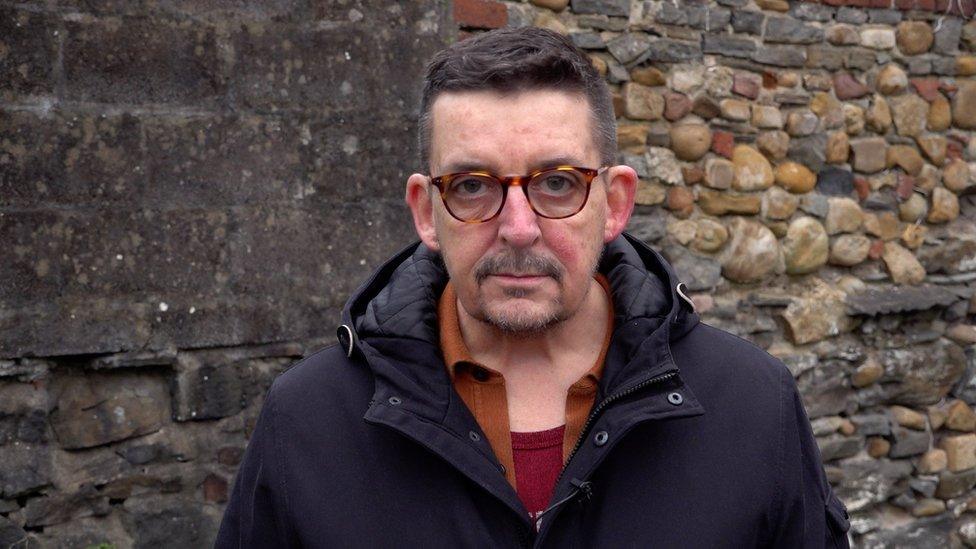Cancer waiting times performance in Wales hits low
- Published

Uphill challenge - Laura cycling six weeks after surgery
Exercise got Laura Butcher through her bowel cancer diagnosis.
The 40-year-old is a keen triathlete and said her fitness allowed her to cope better with the chemotherapy in particular.
"If I didn't have the tri-club, I'd have gone mad. It's kept me going, it's been good for body and mind," she said.
She was diagnosed on 23 July last year, but her treatment didn't start until November - one of hundreds who miss the 62-day target every month.
Although she also went through IVF in that time to harvest eggs before treatment affected her fertility.
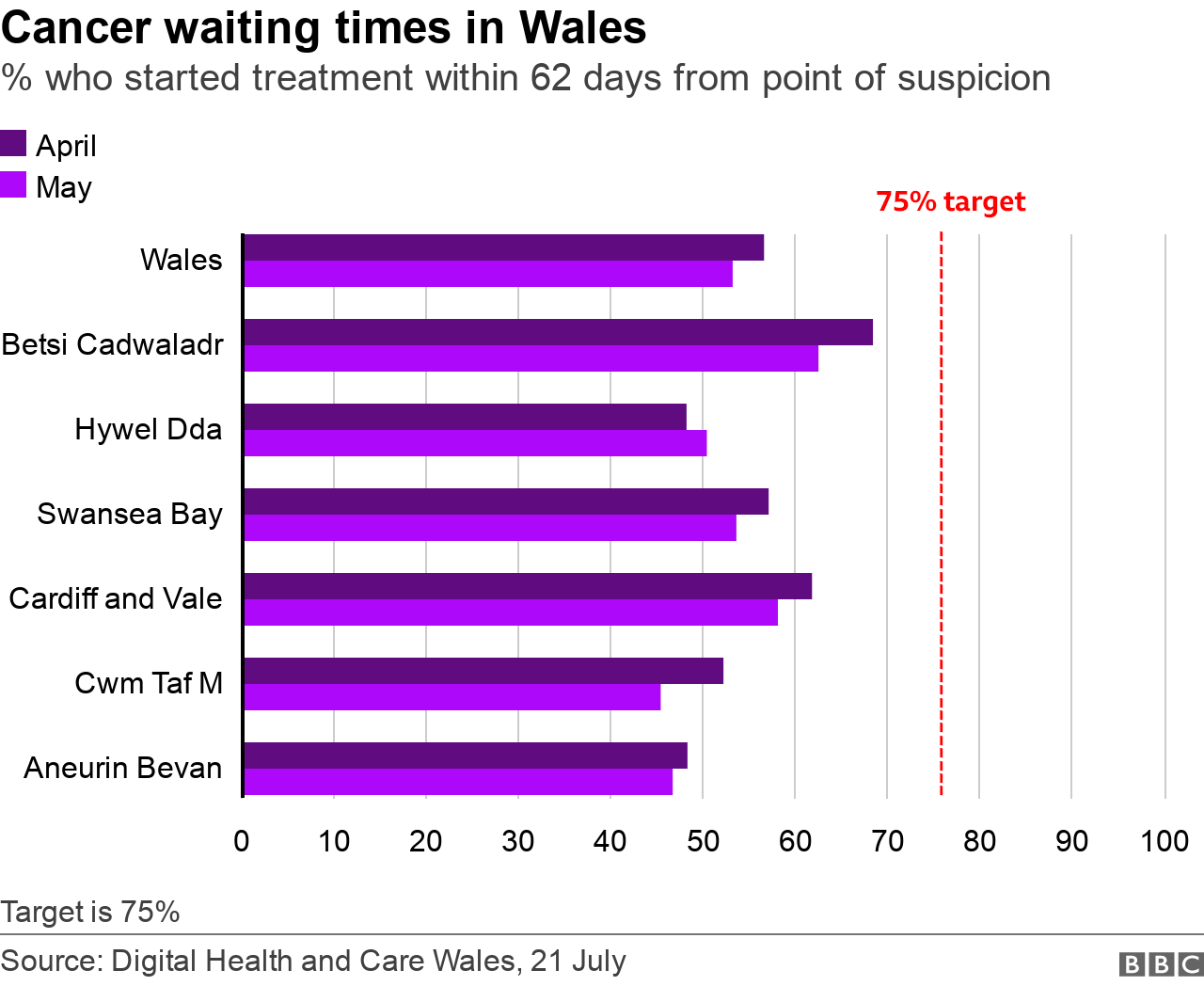
The figures show the target was missed for 774 patients, which is 47% of all patients who were newly diagnosed.
That's the joint worst performance on record, equalling January's figure.
Macmillan Cancer Support said action was needed to get Wales back on track to meet ambitions for 80% to start treatment within the 62-day target time.
"For far too long, and well before this pandemic began, there has been a trend of consistent under-performance on meeting cancer treatment targets in Wales and this worsening trend shows how vitally important it is to put things right," said Richard Pugh, head of partnerships for the charity in Wales.
Plaid Cymru called for an action plan to deal with early diagnosis and "rapid treatment".
Health minister Eluned Morgan has asked for an explanation and said one reason was that treating people waiting the longest for cancer treatment could have a knock-on further down the list. But she acknowledged that "it's not good" and wanted to make inroads very shortly.
"I have made it absolutely clear that this is a priority that I am expecting to see some change," she told BBC Wales.
The Welsh government said 1,646 people started cancer treatment in May, 15% more than in the previous month, while 11,800 people had been told they hadn't got cancer.
Laura said: "There is still a mindset that this is 'an old man's disease' and I was diagnosed at 39.
"Nobody likes to talk about poo - it's a taboo subject and I've got people talking about it. And that's all I care about. I don't want anyone else going through the same thing as I went through."

Laura with a dedication to the late campaigner and podcaster Dame Deborah James - and showing off 'Etna' - the nickname for her stoma
In the past month she's been involved in a new scheme being run by Cwm Taf Morgannwg health board offering prehab and rehab sessions to patients with suspected or confirmed bowel cancer, as well as those with oesophogeal and stomach tumours.
Patients attend three sessions a week in the run-up to their surgery or alongside treatment, focusing on exercise, mindfulness and wider emotional and wellbeing support.
The goal is to reduce their recovery time in hospital, improving both their own prospects, and freeing up vital beds in hospitals.
Patients who have major colorectal cancer surgery often do poorly after their operations and we know that’s partially related to the fitness of the patients to start with.
Rhidian Jones, consultant anaesthetist at the Princess of Wales Hospital in Bridgend and leader of the prehab programme, said people who are fitter have fewer complications.
"If you have a complication in hospital your length of stay is trebled," he said.
"So on average our colorectal cancer patients stay in hospital about six to seven days - if you have a major complication that goes up to three weeks.
"So you can see the massive potential benefit it can have on patient flow through the hospital. It not only benefits the cancer patients, it also benefits our elective work - there's more beds available to do elective knee and hip replacements."
It's an important ambition, given the figures also reveal yet another rise in the numbers waiting for planned care, with record numbers again waiting.
Patients who take longer to recover impact on the flow through the hospital, meaning beds aren't available for patients to be admitted when they arrive at A&E.

The figures show 66.4% of patients were dealt with within four hours. This is marginally worse than the previous month.
There were slight improvements at the hospitals with the worst figures - Glan Clwyd and Wrexham Maelor in north east Wales.
There were also almost 10,300 patients waiting 12 hours or more in Wales in June.
On average, patients are waiting three hours and two minutes in emergency care before being admitted, discharged or transferred. That's the third longest time on record.
Likewise it means more ambulances wait outside hospitals for patients to be seen inside - with the response to immediate life-threatening calls the second worst on record.
'Grim reading'
Only 50.8% of these "red" calls had a response within eight minutes. The target is 65%.
Welsh Conservatives described the figures as "grim reading," while the Liberal Democrats said the Welsh government needed a "better handle" on the crisis.
"What we need to see is real investment in primary health services in local communities, including our GPs to prevent these build-ups at emergency departments," said Welsh Lib Dem leader Jane Dodds.
Plaid Cymru health spokesman Rhun ap Iorwerth added: "Money to recruit more staff is only answering part of the problem - our NHS needs more than a sticking plaster to overcome the challenges it faces".
But the Welsh government responded by saying there continued to be a rising demand for emergency care, while "pressures are being intensified due to challenges with patient flow through the hospital system, as well as staffing constraints including a rise in Covid sickness".
The Welsh NHS Confederation said the health service was "creaking under these consistently high levels of pressure" and that money to recruit more ambulance staff was only addressing part of the problem.
"Unless we can improve patient flow and speed up hospital discharge by alleviating the pressure on and creating capacity in social care, we'll continue to see a large number of patients waiting longer than we'd like them to," said assistant director Nesta Lloyd-Jones.

Overall, the figures for May show more than 722,000 "patient pathways" were waiting for hospital treatment, another record high.
As one patient may be on more than one "pathway" to treatment, if they have different conditions, the number of patients affected will be lower.
For the first time, the official figures - for March - put a number on these, so we can estimate that it is likely that more than 560,000 actual patients are waiting for treatment.
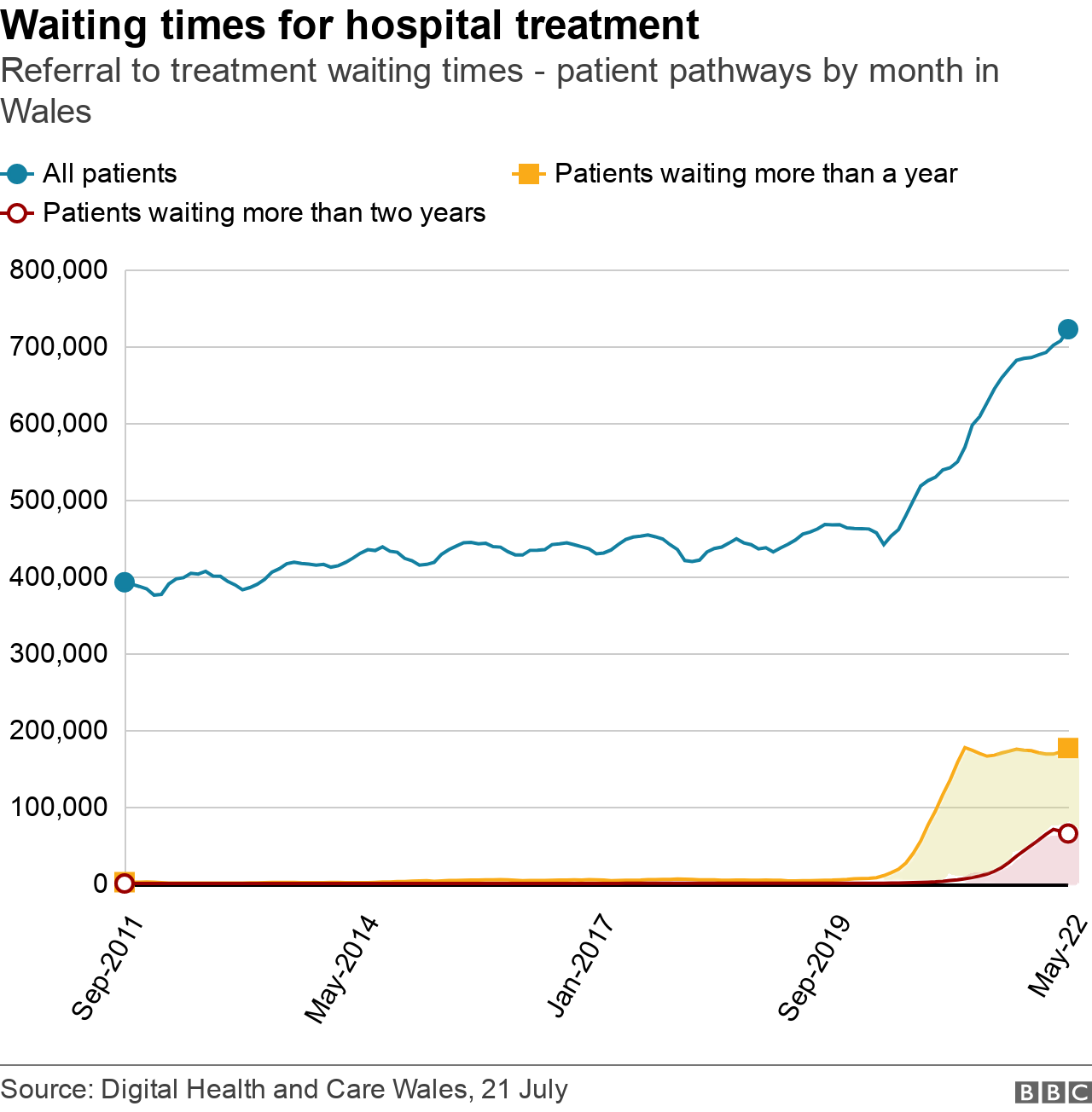
The Welsh government said there had been progress on reducing the very longest waits.
The numbers waiting more than two years for treatment to start has dropped by nearly 3,000 to 65,053, a second monthly drop after a spike during the pandemic.
But the number of "patient pathways" with waits of more than a year has grown to more than 176,300 - its highest figure since March last year.
"Despite the increase in demand, huge numbers of patients were seen in May with the highest number of inpatient and day case treatments carried out (24,167) since the start of the pandemic," said a spokesperson.
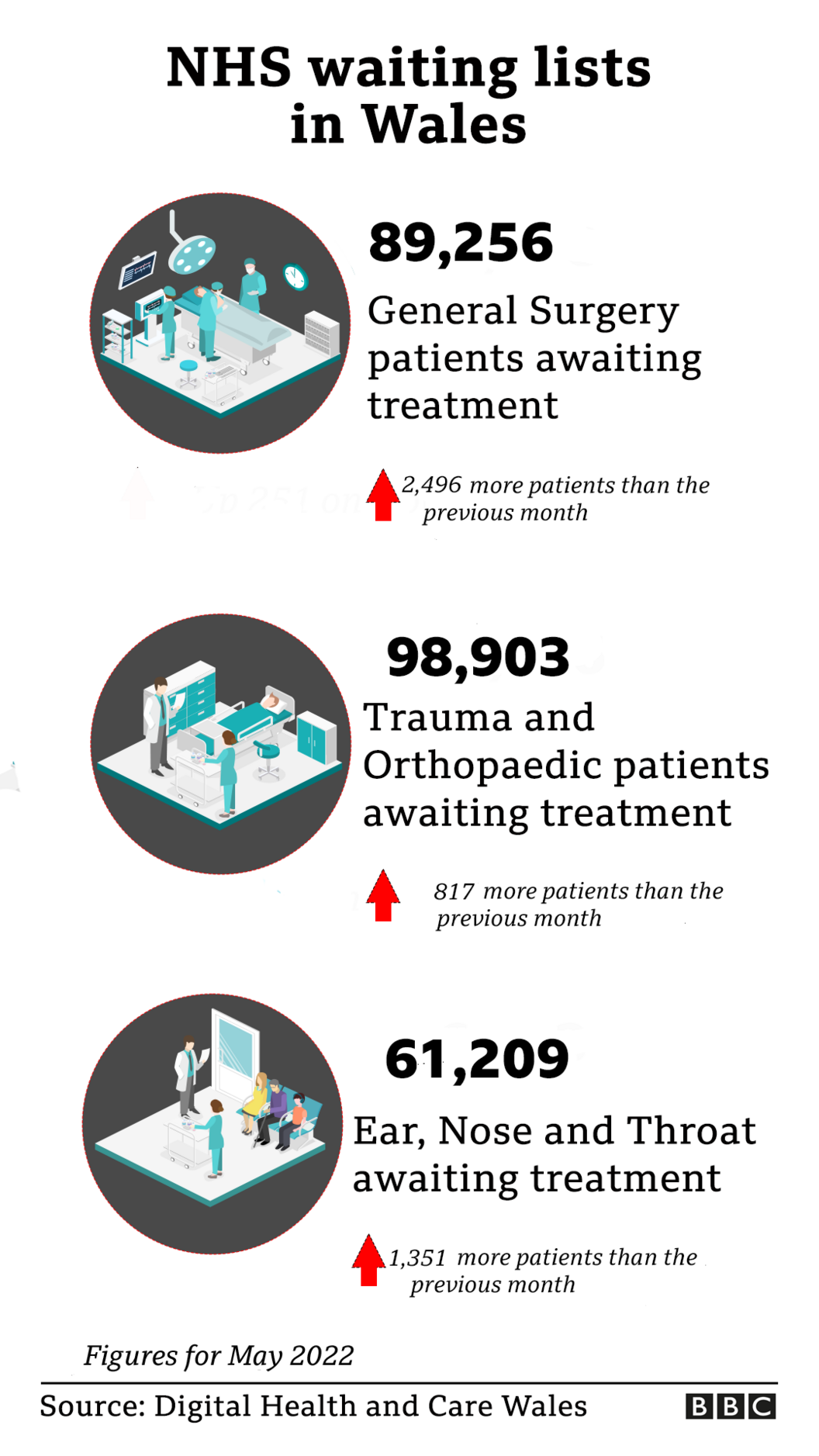
- Published20 July 2022

- Published23 June 2022
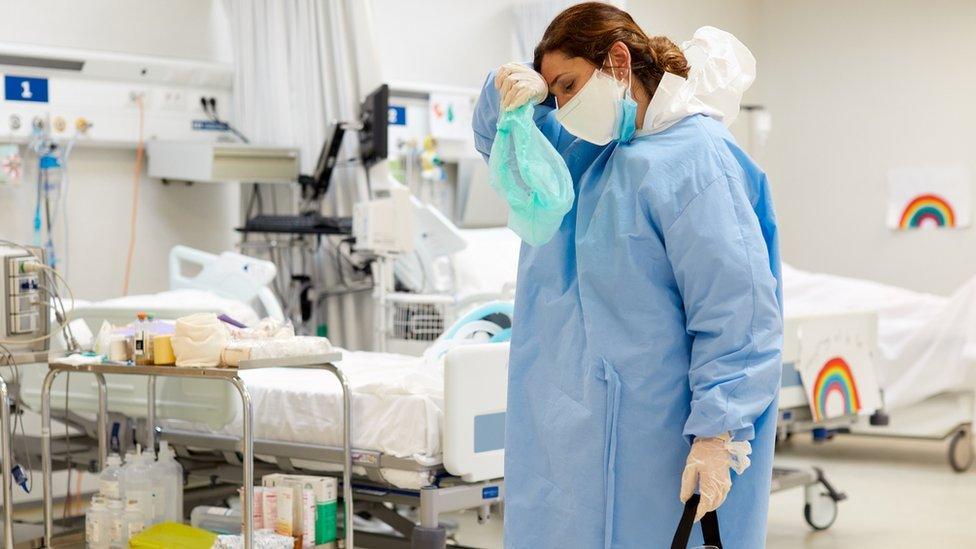
- Published20 January 2022
